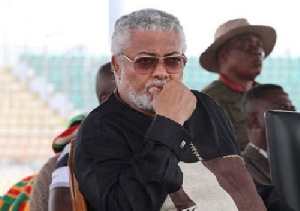 Former President Jerry John Rawlings
Former President Jerry John Rawlings
You see, the Council-of-State was not established for protracted military dictators like Chairman Jerry John Rawlings, which is why the erstwhile longtime Ghanaian strongman turned elected President had great difficulty in fulfilling his constitutional obligations under Article 89 Subsection 2a of the country’s 1992 Republican Constitution (See “Council-of-State Advice Not Mandatory to President – Rawlings” 3News.com / Ghanaweb.com 8/16/17).
I am, however, elated that under the tenure of President Addo DankwaAkufo-Addo, a sound and conducive, as well as productive, atmosphere has been created for experienced former Presidents like Chairman Rawlings and Mr. John Agyekum-Kufuor to actively and healthily participate in the same forum, and on the same platform, on issues pertaining to the good, democratic governance of the country.
By the same token, I have absolutely no doubt in my mind that former President John Dramani Mahama is equally making himself useful and productive to the rag-tag regime of Kenya’s President Uhuru Kenyatta. After all, hasn’t it been acutely observed by our elders for ages that birds of same feathers flock together?
The article cited above stipulates that the composition of the Council-of-State must include “One person who has previously held the office of Chief Justice of the Supreme Court of Ghana; one person who has previously held the office of Chief of the Defense Staff of the Ghana Armed Forces; and one person who has previously held the office of Inspector-General of the Ghana Police Service.”
If the following previous office holders are not already included in the composition of the membership of the Council-of-State, then maybe the President ought to think about tabling a motion in Parliament to have them added to the same. And these are a retired Director-General of Ghana Prisons Service; a retired Director-General of the Ghana Education Service; and a retired or former Director-General of the Ghana Health Services. There may still be the need to add representatives from other sectors of Ghanaian society that are not already seated, or represented, on the Council-of-State, and others as yet unrecognized distinguished Ghanaian citizens and professionals.
Indeed, at some point in the near future, the institution of the Council-of-State will have to be elevated to the status of a Senate or the Upper House of Parliament, which was the objective of Dr. J. B. Danquah, the putative Doyen of Gold Coast and Ghanaian politics, who originally proposed the entire concept of the Council-of-State, based on both his meticulous study of the British House of Lords and the traditional Akan-Ghanaian Chieftaincy Institution (See Okoampa-Ahoofe, Jr’s Dr. J. B. Danquah: Architect of Modern Ghana).
Mr. Rawlings created his own set of problems when he unwisely ignored the pleas of renowned and respected global leaders like then-President James “Jimmy” Carter and summarily executed several topmost leaders of the Ghana Armed Forces and caused other equally distinguished Ghanaian leaders and citizens to flee the country for the safety of their lives.
It is quite instructive but perhaps totally pointless for Chairman Rawlings to have to come to the grim and wistful realization that he had not served the larger and greater interests of the nation when he literally and recklessly took the laws of the land into his own hands.
Perhaps, we need to broaden the scope of Article 89 Subsection 2a of the Constitution, by mandating the inclusion of any former Justice of the Supreme Court of Ghana, rather than the unhealthily restrictive present clause which names only a former Chief Justice of the Supreme Court.
Then also, the clause pertaining to the Inspector-General of the Ghana Police Service could be more productively broadened to include a former Commissioner of Police, for only one example. Indeed, elevating the Council-of-State to the more potent status of a Senate will also make its activities more relevant, respectable and productive to the development of the quality of Ghanaian democracy.